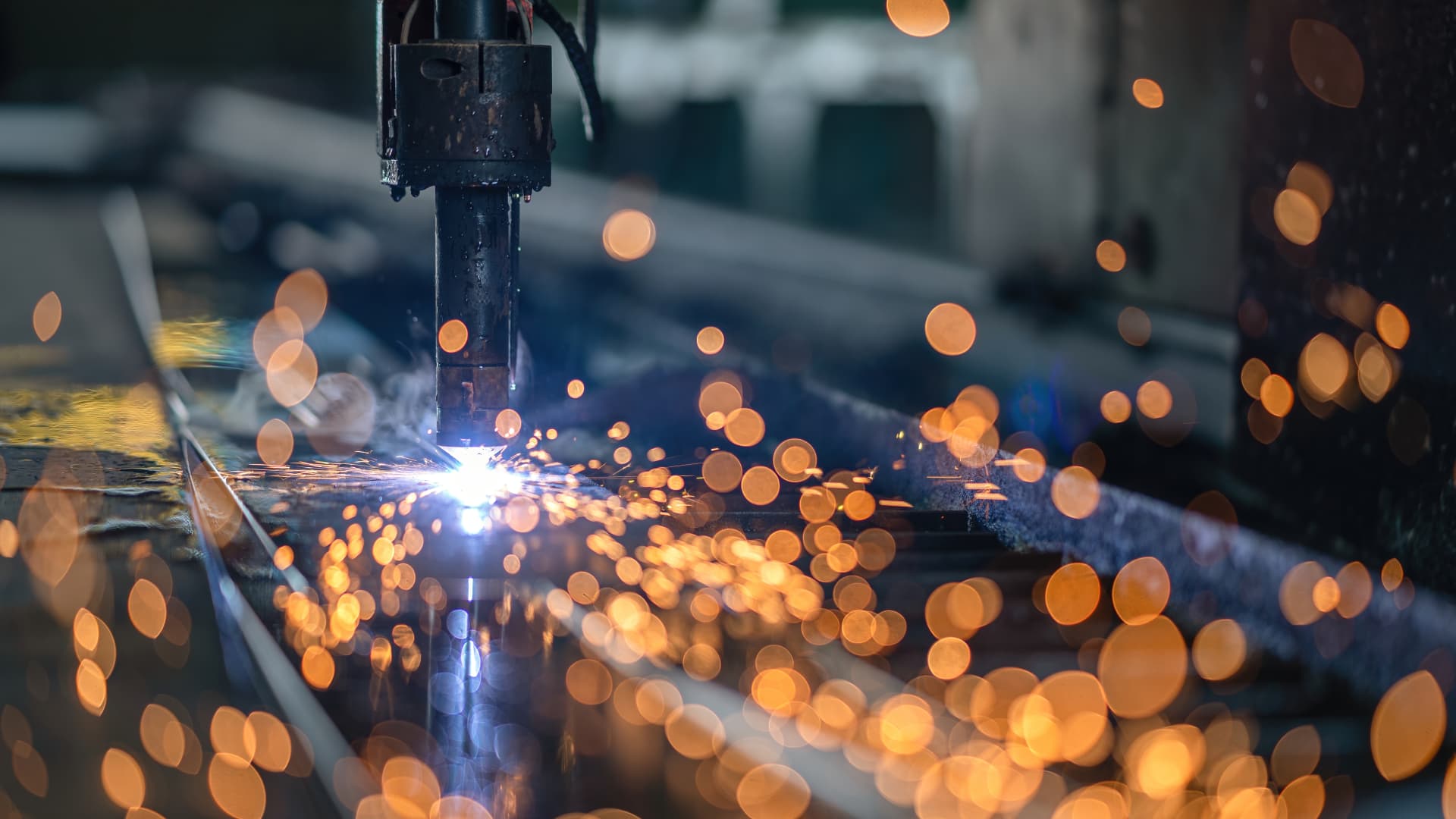Sefa Ozel | E+ | Getty Images
Russia is still obtaining large volumes of Western technology critical to its war in Ukraine, even as sanctions show some sign of taking hold, new analysis shows.
China, Hong Kong, Turkey and the United Arab Emirates have been increasingly important in funneling critical components to Russia, according to new research, as supply chains have adapted in response to export controls aimed at choking off Moscow’s military machine.
In response to Russia’s full-scale invasion of Ukraine on Feb. 24, 2022, a Western coalition of allies including Japan and South Korea imposed a series of sanctions restricting the sale of certain goods to Russia, including advanced technologies for use in the military.
Yet Western-origin technologies still accounted for almost half of all Russian imports of critical components and “high-priority” battlefield goods in the first three quarters of 2023, according to research from Ukrainian think tank KSE Institute and the Yermak-McFaul International Working Group, which promotes sanctions against Russia.
Such products are typically designed by companies headquartered in Western coalition countries, but manufactured and distributed abroad — often making their supply chains harder to police. Earlier CNBC investigations indicated that these third-country intermediaries are generally based in countries without direct sanctions on Russia — primarily China, as well as Turkey and the UAE.
Moscow imported more than $22 billion worth of critical components between January and October 2023, Russian trade data shows. Over the same period, it also imported almost $9 billion worth of “high-priority” battlefield components, which Western authorities have specifically sanctioned.
Such goods include microchips, communications equipment, computer components, bearings and transmission shafts, and navigation and sensor devices — which can be used in a range of military equipment including drones, radios, missiles and armored vehicles.
The trade flows mark an uptick from the first six months of the Russia-Ukraine war, when Russian imports dropped off dramatically.
When compared to pre-war levels, however, the figures point to a downward trend, with Russian imports of critical components and battlefield goods down 29% and 10%, respectively.
The report’s authors said the data suggests that some export controls are working, and that Russia has been unable to find reliable substitutes for many Western components. They noted that more needs to be done to bolster enforcement and clamp down on remaining loopholes.
“We are finally starting to see this slow but somewhat positive trend,” Olena Bilousova, senior research lead at KSE Institute and one of the report’s authors, told CNBC. “Sanctions are not a measure you can enforce and expect to see the effects tomorrow.”
The findings mirror comments made Tuesday by Ukrainian President Volodymyr Zelenskyy, who said that there were “clear signs of a slowdown” in Russia’s defense industry. Zelenskyy did not provide evidence for his assertion, and Russia has separately said that its production of military equipment has stepped up.
U.S. tech continues to enter Russia
According to the new research, products originating from U.S.-headquartered companies accounted for the second-largest share of Russian imported battlefield goods (27%) and critical components (19%) after China.
The U.S. products originated from companies including tech giants Intel, Analog Devices, Advanced Micro Devices and Texas Devices — all of whose equipment has been found in Russian weaponry on the battlefield in Ukraine, according to KSE.
While the data points to a slowdown in the supply of products from some companies in 2023 versus 2022, including Intel and AMD, it also suggests an increase for others, namely Analog and Texas.
These upticks can’t go unnoticed by internal controls.
Olena Bilousova
senior research lead at KSE Institute
Bilousova said the trends indicate that such products are still finding their way to Russia, “and, moreover, their volumes are increasing” over time. “These upticks can’t go unnoticed by internal controls,” she added.
CNBC reached out to the companies cited and all of them said that they had ceased trading with Russia in the wake of the war and that their operations were in compliance with sanctions.
In a statement, Analog Devices said that any post-sanctions shipments to Russia were a “direct violation of our policy and the result of an unauthorized resale or diversion.” Meanwhile, Intel said that it is actively working to “track and mitigate potential distributor issues.”
Texas Devices said that it “strongly oppose(s) our chips’ use in Russian military equipment and the illicit diversion of our products to Russia,” and that it takes action if it learns that its distributors do not comply with export controls. AMD similarly said it “does not condone and works to disrupt the malign use of our products in Russian military equipment” and that it operates compliance and monitoring programs to prevent such use.
The report’s findings highlight the continued challenges faced by the industry in monitoring its complex supply chains. In a January 2023 blogpost, the Semiconductor Industry Association, which represents around 99% of the U.S. semiconductor industry and around two-thirds of non-U.S. chip firms, highlighted the issue, but said the industry was “deeply committed” to working with the U.S. and allied governments to address the “illicit diversion” of its technology.
Russia’s advanced machine tool imports soar
Elsewhere, the report also highlighted a significant increase in Russian imports of a class of advanced machine tools critical to Moscow’s military production since the start of the war.
Russia imported $189 million of “computer numerical control” machinery between January and October 2023, according to KSE analysis. It marks an 88% increase versus pre-war levels, with the majority of these tools coming from Western coalition countries.
Computer Numerical Control (CNC) machine used for cutting and welding a steel structure at an industrial manufacturer.
Vithun Khamsong | Moment | Getty Images
CNC machines are automated industrial tools widely used in the aerospace, automotive and defense industries. Their applications can include the production of weapon hulls, aircraft parts, missile and drone components, and microelectronics.
Such goods became the target of U.S. and EU sanctions in late 2023, making it more complicated and expensive for Russia to obtain them. However, new indications suggest that China may be stepping in to plug that gap.
Chinese shipments to Russia of CNC tools have increased tenfold since the start of Moscow’s full-scale invasion of Ukraine, according to an FT analysis of Russian trade data released last week.
Reinforcing economic sanctions
Given the potential impact of sanctions — and their clear failure in some cases — Western authorities must now do more to improve enforcement, the report’s authors said.
Elina Ribakova, director at KSE Institute, said policymakers must demand greater corporate responsibility, while closing policy gaps in Russian export controls, including tackling circumvention via third countries.
“Without the private sector piece, we’re just not going to move forward,” Ribakova said. “And from the policy side, there is no signal what that policy would be so they don’t want to stick their heads above the parapet.”
Additionally, she called for greater cooperation between enforcement agencies in coalition countries to improve the robustness of the sanctions regime more broadly.
It’s not just about the effectiveness of the Russian sanctions. It is also about the credibility of the entire sanctions regime.
Benjamin Hilgenstock
senior economist at KSE Institute
Closing the gaps in sanctions enforcement could prove critical not only to Ukraine’s victory but also to the integrity of export controls more broadly.
“It’s not just about the effectiveness of the Russian sanctions. It is also about the credibility of the entire sanctions regime,” KSE’s senior economist Benjamin Hilgenstock said. “Technology sanctions are rightfully seen as a new frontier in economic statecraft.”
That is something Western policymakers will need to keep front of mind as they confront other geopolitical tensions, including with an increasingly assertive Beijing, Ribakova added.
“If they cannot even limit Russia, it is really not clear how they plan to do foreign direct policy on China,” she said.







